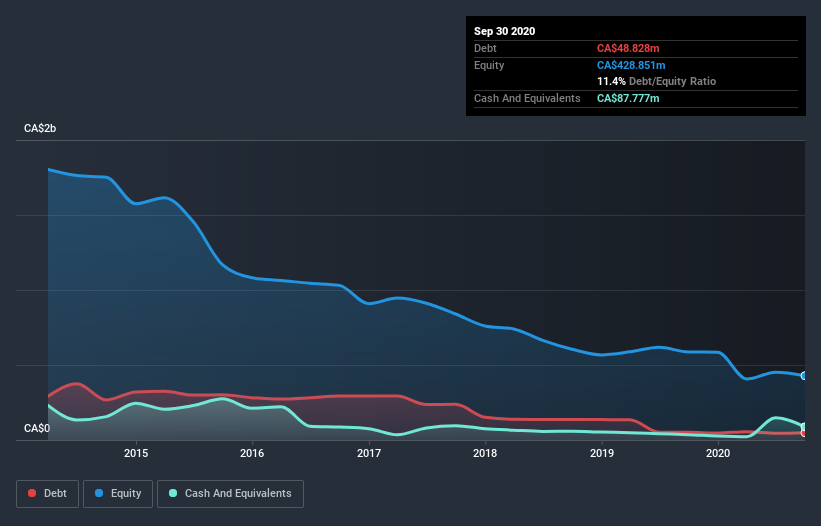Howard Marks put it nicely when he said that, rather than worrying about share price volatility, 'The possibility of permanent loss is the risk I worry about... and every practical investor I know worries about.' When we think about how risky a company is, we always like to look at its use of debt, since debt overload can lead to ruin. Importantly, Dundee Corporation (TSE:DC.A) does carry debt. But the real question is whether this debt is making the company risky.
When Is Debt A Problem?
Debt assists a business until the business has trouble paying it off, either with new capital or with free cash flow. Ultimately, if the company can't fulfill its legal obligations to repay debt, shareholders could walk away with nothing. However, a more frequent (but still costly) occurrence is where a company must issue shares at bargain-basement prices, permanently diluting shareholders, just to shore up its balance sheet. Having said that, the most common situation is where a company manages its debt reasonably well - and to its own advantage. The first step when considering a company's debt levels is to consider its cash and debt together.
See our latest analysis for Dundee
What Is Dundee's Net Debt?
You can click the graphic below for the historical numbers, but it shows that Dundee had CA$48.8m of debt in September 2020, down from CA$51.9m, one year before. However, it does have CA$87.8m in cash offsetting this, leading to net cash of CA$38.9m.

How Strong Is Dundee's Balance Sheet?
Zooming in on the latest balance sheet data, we can see that Dundee had liabilities of CA$41.5m due within 12 months and liabilities of CA$60.6m due beyond that. Offsetting this, it had CA$87.8m in cash and CA$22.6m in receivables that were due within 12 months. So it can boast CA$8.34m more liquid assets than total liabilities.
This surplus suggests that Dundee has a conservative balance sheet, and could probably eliminate its debt without much difficulty. Succinctly put, Dundee boasts net cash, so it's fair to say it does not have a heavy debt load! There's no doubt that we learn most about debt from the balance sheet. But you can't view debt in total isolation; since Dundee will need earnings to service that debt. So when considering debt, it's definitely worth looking at the earnings trend. Click here for an interactive snapshot.
In the last year Dundee had a loss before interest and tax, and actually shrunk its revenue by 14%, to CA$30m. That's not what we would hope to see.
So How Risky Is Dundee?
By their very nature companies that are losing money are more risky than those with a long history of profitability. And in the last year Dundee had an earnings before interest and tax (EBIT) loss, truth be told. And over the same period it saw negative free cash outflow of CA$39m and booked a CA$99m accounting loss. Given it only has net cash of CA$38.9m, the company may need to raise more capital if it doesn't reach break-even soon. Overall, its balance sheet doesn't seem overly risky, at the moment, but we're always cautious until we see the positive free cash flow. For riskier companies like Dundee I always like to keep an eye on whether insiders are buying or selling. So click here if you want to find out for yourself.
If you're interested in investing in businesses that can grow profits without the burden of debt, then check out this free list of growing businesses that have net cash on the balance sheet.
If you’re looking to trade Dundee, open an account with the lowest-cost* platform trusted by professionals, Interactive Brokers. Their clients from over 200 countries and territories trade stocks, options, futures, forex, bonds and funds worldwide from a single integrated account. Promoted
New: Manage All Your Stock Portfolios in One Place
We've created the ultimate portfolio companion for stock investors, and it's free.
• Connect an unlimited number of Portfolios and see your total in one currency
• Be alerted to new Warning Signs or Risks via email or mobile
• Track the Fair Value of your stocks
This article by Simply Wall St is general in nature. It does not constitute a recommendation to buy or sell any stock, and does not take account of your objectives, or your financial situation. We aim to bring you long-term focused analysis driven by fundamental data. Note that our analysis may not factor in the latest price-sensitive company announcements or qualitative material. Simply Wall St has no position in any stocks mentioned.
*Interactive Brokers Rated Lowest Cost Broker by StockBrokers.com Annual Online Review 2020
Have feedback on this article? Concerned about the content? Get in touch with us directly. Alternatively, email editorial-team (at) simplywallst.com.
About TSX:DC.A
Solid track record with adequate balance sheet.
Similar Companies
Market Insights
Community Narratives



